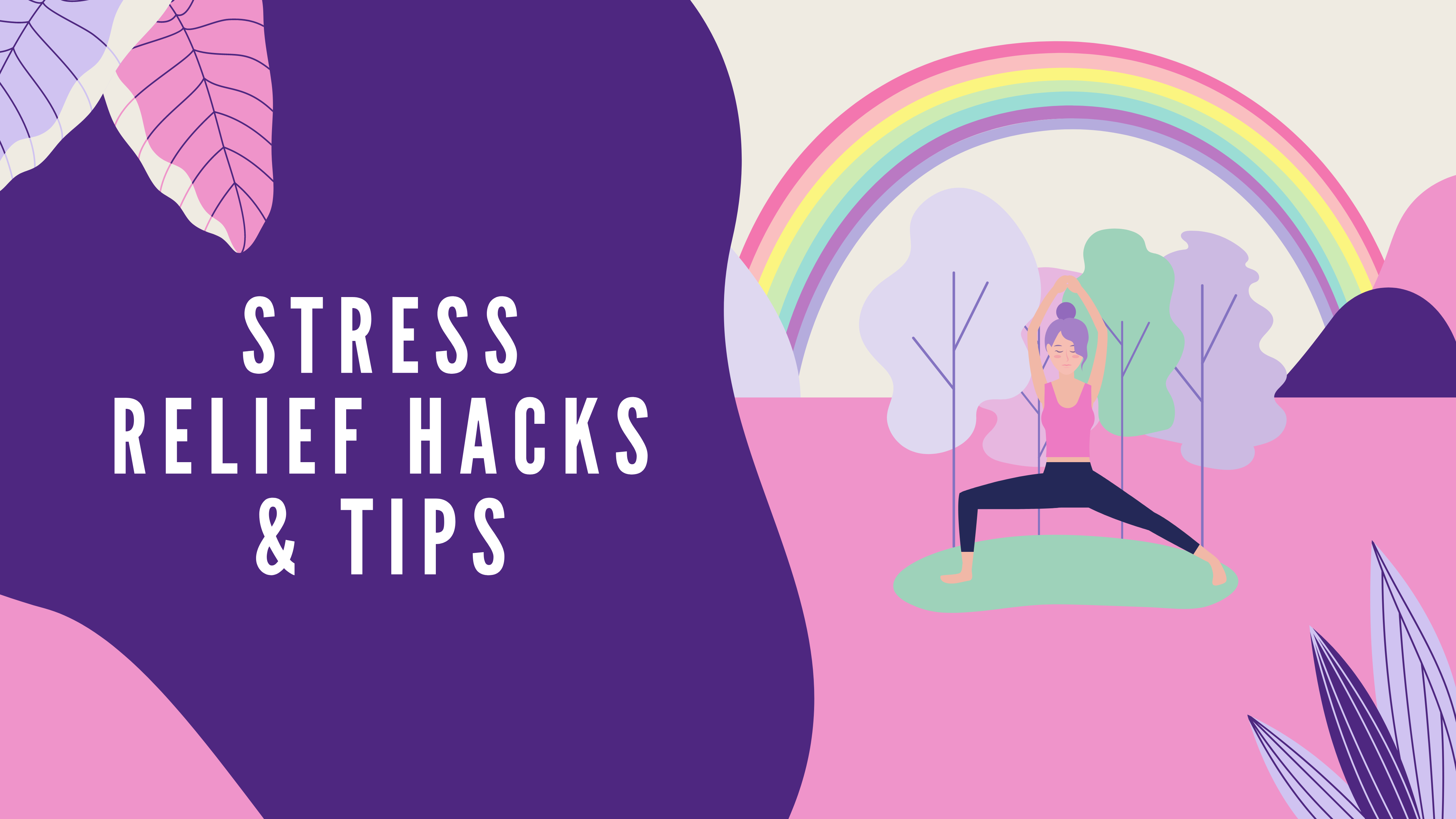STEP 1: Identify when you're stressed
Have you ever experienced a moment where you explode because of stress? It just felt like it came out of nowhere, and you weren’t even aware it was coming. It might be hard to believe, but we can actually avoid these moments where we feel out of control. Crazy, right?!
We each respond to stress differently. Some may scream or yell, cry, grunt out of frustration, walk out or withdraw altogether. We hate reaching this point – I mean, who’s happy with themselves having just burst into a tantrum like a child or said crazy things because they were out of control – but it can happen to all of us.
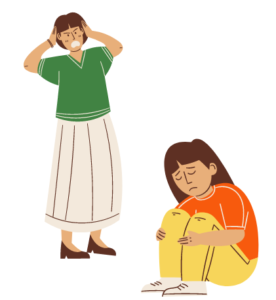
It’s important – and totally possible – to recognize how you respond so you can identify when you’re stressed as early as possible. All it takes is some intentionality and awareness – and those are developed with consistent practice.
Stress is a physical and emotional response to a situation. It could either be from a positive or negative situation, and your body doesn’t know the difference. It just knows that something is happening, and it should get ready to respond. When the body becomes aware of stress, it responds by sending out a flood of hormones. These hormones prepare the body to do what is needed to adapt and survive.
We can't avoid stress
So the first thing is to become aware of when it’s happening to you (or about to happen). This first step will go a long way in helping you relieve yourself of stress. Because once you’re aware, you can begin to change how you respond.
At the first awareness of stress, try taking some deep breaths. Just inhale deeply and slowly and exhale completely and then do it again and as many times as is helpful. Breathing deeply helps to calm our parasympathetic nervous system so that we are once again in rest and digest mode rather than fight or flight. Once you begin to identify when stress hits, you can make healthy changes in the right direction. Be patient with yourself as you practice this – it can take time, but you’ll get there. 💜
Practice deep breathing
Deep breathing increases the supply of oxygen to our brains, which activates the parasympathetic nervous system and improves HRV (heart rate variability), promoting a state of calmness in the body. Breathing techniques help us feel connected to our bodies, bringing our awareness away from the worries in our heads and quieting our minds. When you practice deep breathing, your metabolism decreases, your heart beats slower, your muscles relax, your blood pressure decreases, and your nitric oxide level increases.
The way you breathe affects your whole body, changing your physical and emotional responses to stress. Breathing exercises are easy to learn & apply and can be done without anyone even knowing – yay! You can do them whenever you want, and you don’t even need any special tools or equipment.
One of my favorite breathing techniques is commonly called 4 Square, and this is how you do it:
- Breathe in for a count of 4,
- hold for a count of 4,
- breathe out for a count of 4 and
- hold for a count of 4 – and repeat as many times as needed.
Can you see how focusing on counting to 4 will help clear your mind of stress factors?
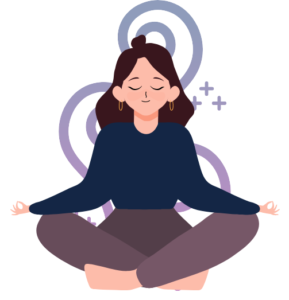
Take a break from using social media
- Too much use can trigger feelings of isolation and inadequacy
- Taking a break makes you less prone to high levels of cortisol, making you feel calmer and more focused
- Can improve your overall mood and help you sleep better
- Start by putting your phone away from your bed an hour before going to sleep
Avoid watching the news
- It causes your body to release stress hormones like cortisol and adrenaline
- Set healthy boundaries or avoid it altogether
- Do something healthy afterward to stay grounded and resilient
- Start by turning off the news at least an hour before going to bed
STEP 2: Eat nourishing foods
A nutrient-dense diet can counterbalance stress by strengthening the immune system, stabilizing moods, and reducing blood pressure.
Here are the stress-busting nutrients you need to be getting enough of:
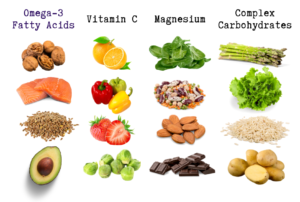
- Omega-3 Fatty Acids, which you can quickly get from eating walnuts, fresh flax or chia seeds, Brussels sprouts, avocado, wild-caught salmon, herring or tuna, 🐠 oysters, 🦪 and grass-fed beef 🐄 . My favorite sources are avocado, salmon and beef! Yum! 🥑
- Complex Carbohydrates such as peas, beans, brown and wild rice, 🍚 quinoa, potatoes, 🥔 chickpeas, and non-starchy vegetables (artichokes, asparagus, lettuce, 🥬 celery and a ton more) boost serotonin production and balances your blood pressure.
- Vitamin C from fruits like oranges 🍊 or other citrus fruits 🍋 can lower cortisol levels + boost your immune system.
- Magnesium from leafy greens 🥗 (1 cup of spinach is already half of the RDA), legumes, almonds, cashews, dark chocolate 🍫 , avocados 🥑 and salmon can improve sleep quality, prevent mood swings from PMS, and prevent headaches.
Herbal teas have a calming effect and can also help reduce stress.
We are better prepared to handle stress when nutritious foods are the main part of our diet. Eating nutrient-dense foods is a good defense against stress. When I’m eating off-plan, I’ve noticed that I am more easily triggered and less able to handle stress reasonably. That doesn’t mean it keeps me from splurging once in a while. But because I recognize that this can be a side effect, I am more aware and able to recover quickly by getting back to a nutrient-dense diet as soon as possible.
Reduce or eliminate caffeine
- Don’t drink too much or, don’t consume any at all (☕-☕☕ in the morning max)
- Avoid after 2 o’clock noon.
- Partner it with any exercise or physical movement (to help it cycle through your system).
- Hydrate with plenty of water after caffeine (better yet, consistently throughout the day)
CBD and Other supplements
- CBD activates the endocannabinoid system (ECS) receptor which induces a sense of calm
- You can incorporate it in your relaxing daily routine to boost its effect
- Supplements can help you increase your body’s resistance to life’s stressors
Aromatherapy and Essential oils
- Scents can directly impact our bodies through our nervous system.
- It taps into the healing power of scents to balance your mind, body, and spirit.
- Using essential oils can induce calm, aid with sleep, and help reduce stress and anxiety.
STEP 3: Exercise, take a walk
Any form of exercise can act as a stress reliever. Physical activity improves our body’s ability to use oxygen and increases blood flow. These changes have a direct effect on your brain, in a good way. You don’t have to be an athlete to experience the stress relief benefit of being active. Even if you’ve been a couch potato lately, a little exercise can go a long way toward stress management. Just get moving – even 10 minutes a day will help you take advantage of the possible benefits exercising can create:
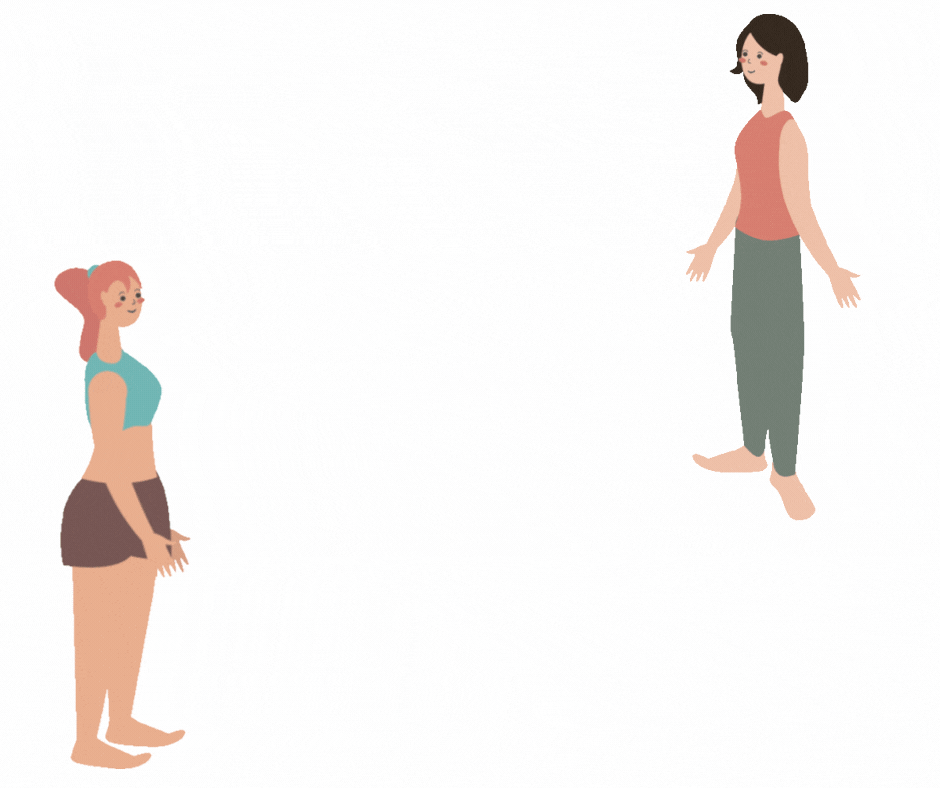
- It pumps up your endorphins. Endorphins are the “feel-good” neurotransmitters that are responsible for the coveted “runner’s high.” It is the sense of well-being and euphoria that many people experience after exercise.
- It’s meditation in motion. As you begin to shed your daily tensions through exercise and physical activity regularly, you may notice that you can focus better on a single task. The resulting energy and optimism help you stay calm, clear and focused in everything you do.
- It improves your mood. Regular exercise can increase your self-confidence, improve your mood, and help you relax. Exercise can also improve your sleep, which is usually disrupted by stress, depression, and anxiety. All of these benefits can ease your stress levels and give you a sense of command over your body and your life.
Don't think of exercise as just one more thing on your to-do list
Find an activity you enjoy and make it part of your routine. You don’t have to join a gym or take an hour-long class. Just walk out the door and take a spin around the neighborhood. Set goals and find a friend to join you to keep you accountable and motivated. Any form of physical activity that can help you unwind plays an essential part in your approach to easing stress. Read my blog “The Exercise Dilemma” and “Goals, Habits, & Excuses,” for more ideas on how you can get moving. I have a couple persistent dogs, and they’ll do anything to get out for daily walks. Honestly, if it weren’t for them, I’d walk much less. If you don’t have a dog, consider getting one – or borrow a friend’s – they’re a great excuse to get those steps in!
Engage in gentle movement
To effectively relieve stress, you need to activate your body’s natural relaxation response. Gentle movements such as yoga, tai chi and stretching can help.
- Besides reducing anxiety and stress, it also improves flexibility, strength, balance, and stamina
By focusing your mind on the actions and breathing, it clears the mind – leading to a relaxed state
Emotional Freedom Tapping or EFT
EFT is where you lightly tap specific points on the face and upper body using your fingertips.
- Think of an issue you are struggling with that makes you feel anxious or stressed
- Assess the issue
- Compose a setup statement
- Say out loud or in your mind how you feel while you tap your acupressure points
- Repeat steps
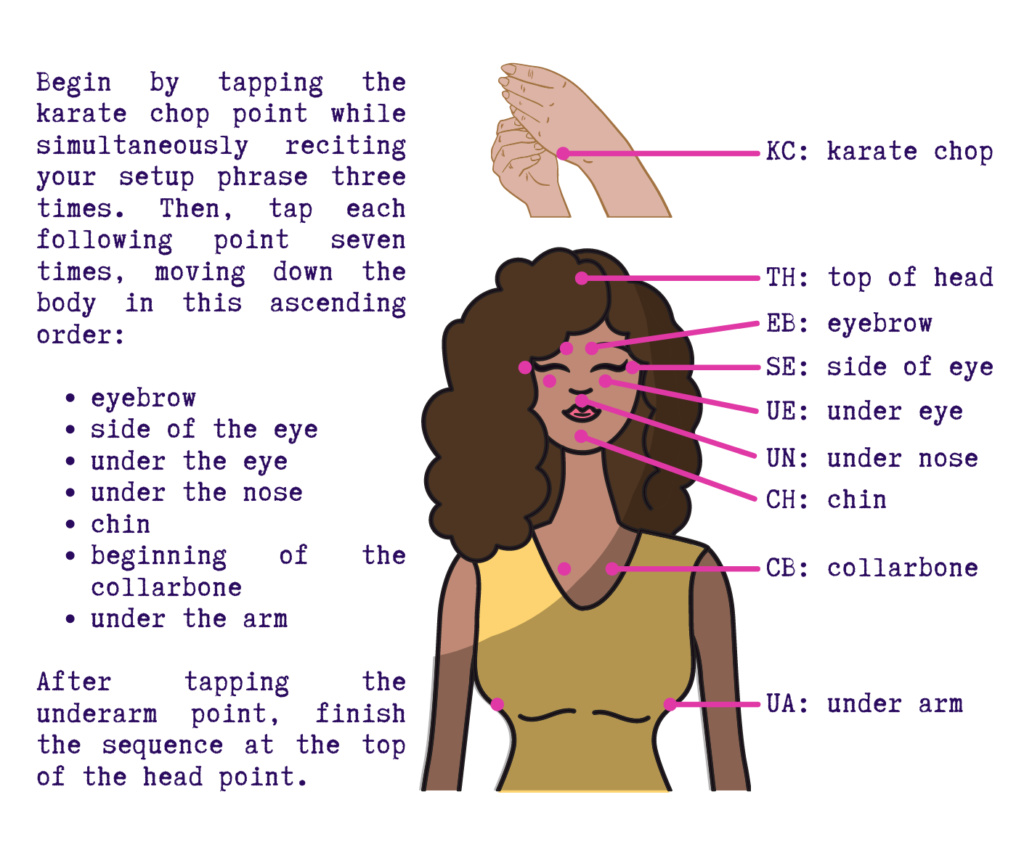
Practice Grounding
Grounding techniques are coping strategies to help separate you from the distress of your emotional state or situation. These techniques may help distract you from what’s troubling you and reconnect you with what’s happening in the present moment (aka “presencing”). It’s basically an exercise to reinstate harmony in your body.
Do the 5-4-3-2-1 technique to reconnect with your 5 senses. Here’s how: Identify five different objects around you, listen to 4 different sounds, feel three different textures, smell two different scents, and acknowledge one taste from your mouth.
Step 4: Prioritize your wellbeing
Return to something you love
- Doing what you love creates a sense of excitement and purpose
- It’s a natural way to relieve stress since it leads you to your happy place.
It helps you feel your best. And when you feel better, you’ll perform better in life and in work
Let your creative juices flow
- Relaxes your amygdala (responsible for our fight-or-flight stress response)
- It produces the same state as meditating
- It takes your attention away from yourself
- Enhances your motor skills and vision
Practice positive psychology
- Use your strengths – assess your top five strengths, and think of ways to use those strengths more in your everyday life. If you’re wondering what your strengths are, I regularly recommend this test to my clients: https://www.viacharacter.org/survey/account/register
- Three good things or blessings – at the end of every day, think of three good things that happened in your day, and consider why you think they happened.
- Gratitude check in – start every morning thinking of the things or people you are most grateful for in your life. Maybe someone for whom you are very grateful, but you haven’t formally thanked. Write down what you’re thankful for about them and read or mail it to them.
- Be kind to yourself – treat yourself like you would your best friend – even when they make a mistake, say the wrong thing, or make the wrong decision. We are often compassionate and forgiving of others but end up treating ourselves with judgment or criticism. Instead of beating yourself down, lift yourself up with kind, positive words.
- Look on the bright side – We tend to have a natural shift toward optimism or pessimism, but that doesn’t mean we can’t alter our tendency. We possess the power to change and we can work on cultivating an attitude of optimism – if we choose.
Practice daily gratitude
- Keep a gratitude journal
- Affirm the good things you’ve received
- Practice affirmative statements about yourself and others
- Acknowledge the role other people play in providing our lives with goodness
- Share your gratitude with others
Laughter therapy
Did you know that there’s a lot of science behind the ways laughter can be good for us? Laughing is another excellent way to reduce stress in our lives and help us cope and survive a stressful lifestyle. It’s all-natural and doesn’t come with any nasty side effects
- Laughter relaxes the body
- It boosts the immune system
- Triggers the release of endorphins
- Laughter lightens one’s heavy load
Physical touch
Physical touch increases levels of both dopamine and serotonin, which relieve stress and anxiety. Hugs from your family, friends, significant other, or pets can feel satisfying and also invoke the release of oxytocin.
Spirituality
Spirituality arises from your connection with yourself and others, your self-value development, and your search for meaning in life. For some, spirituality is achieved through religious worship. For others, spirituality can be found in nature, music, art, or a secular community. Thus, spirituality is different for everyone. Practicing spirituality may help you:
- maintain your sense of purpose
- connect you to the world
- let go of control
- gain perspective
- expand your support network
Last step: SAY NO to things adding to your stress
The first step and last step to my stress relief are closely related. So you’re now aware when you’re about to get stressed, practiced your deep breathing, nourished your body and mind, and prioritized yourself. Your stress decreased, but situations that led to your heightened stress are still present. Why? We are overwhelmed with requests every day – from our employer, our family, ourselves and others. And in a society that maintains the message that multitasking and being productive are requirements for self-worth, we feel as though we can’t say “no.”
Although saying “no” might make you feel uncomfortable, keep in mind that saying “yes” isn’t always healthy – or right. In fact, saying “no” doesn’t make you selfish or inconsiderate. Try and assess the situation first before taking on another task. Ask yourself this:
- Do I have the time for this?
- Is this something I like or hate to do?
- Will this benefit me or burden me?
- Will this open up new opportunities, or will I have to sacrifice prior commitments?

Remember that you’ll have to be assertive when you say “no” to someone, even to yourself – without coming off as rude. It may take some practice in order to feel comfortable saying no. You could also try negotiating the terms when you’re feeling conflicted. For example, when a friend or relative asks you to visit them, you can say, “I would like to see you, but today doesn’t work for me. Can we meet tomorrow instead.” Practice different ways of declining invitations and remember that you are not responsible for how it is received, if you’re saying no in a polite way.
The Takeaway
I hope you’ve taken away some little golden nuggets for stress relief techniques – I learned new things myself in organizing all of this information for you! Each stressful situation will require a different response and now you have a toolbox full of techniques for living your life as stress-less as possible. As American philosopher and psychologist William James once said, “The greatest weapon against stress is our ability to choose one thought over another.” Let’s practice choosing positive thoughts together!

